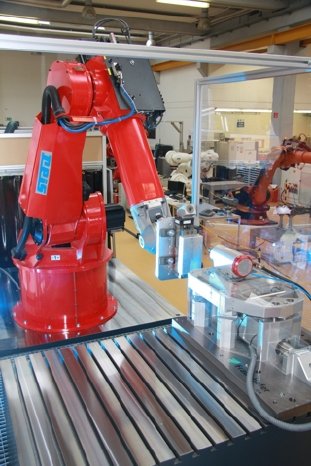The Fraunhofer IPA has developed a separate compensating actuator system for the milling head so that an industrial robot can achieve the accuracy necessary for machining. The inaccuracies which occur with robotic milling units are measured online while the machining is in progress and are corrected directly where they occur in real time by the compensating actuator system. The advantages of the method are obvious: The workpiece is not firmly clamped to a table, as is the case when machining with CNC machines. With this system, the workpiece is gripped by the robot, which guides it as it is machined by the milling head. This means only one machine is required for handling and machining, investment costs decrease, flexibility increases and, in addition, this type of robotic solution can be incorporated well into fully automated production lines.
Piezo actuators and flexures
The compensation kinematics, including the actuator technology and mechanical setup, were developed at the Fraunhofer IPA in Stuttgart and are based on piezo actuators from Physik Instrumente (PI) of Karlsruhe. There were several reasons for this particular choice. The piezo actuators operate without wear and tear, are frictionfree and have no slip. Moreover, they can be accelerated with up to 10 g and are suitable for the high frequencies which are required to compensate the inaccuracies in the robot's trajectory.
Since piezo actuators only operate with small displacements on principle, the IPA combined them with flexures. This made it possible to realize paths up to 690 µm in the application described. The trajectory accuracy of the kinematics in all three axes is in the nanometer range. The flexures which transfer the power and the motion also operate without wear and tear and require little maintenance. They are also lighter, quieter, stiffer, more dynamic and more accurate than conventional compensation mechanisms. Piezo actuators have thus proven once more that they are the driving force behind technical advances. The closedloop robotic solution opens up new possibilities for the milling of metals and plastics.

